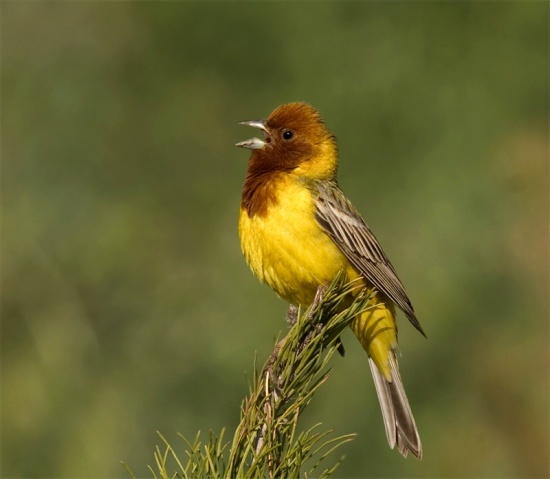KCFoggin-243 (talk | contribs) |
KCFoggin-243 (talk | contribs) |
||
| Line 1: | Line 1: | ||
[[Image:158551104326-large.jpg|thumb|550px|right|Photo by {{user|Seyed+Babak+Mus|Seyed Babak Mus}}<br />Sarakhs, north-east [[Iran]], April 2006]] | [[Image:158551104326-large.jpg|thumb|550px|right|Photo by {{user|Seyed+Babak+Mus|Seyed Babak Mus}}<br />Sarakhs, north-east [[Iran]], April 2006]] | ||
;[[:Category:Emberiza|Emberiza]] bruniceps | ;[[:Category:Emberiza|Emberiza]] bruniceps | ||
| + | |||
[[Image:RHBuntingFemShantilal.jpg|thumb|400px|right|Photo of Female © by {{user|Shantilal|Shantilal}}<br />Gujarat [[Iran]], India 2018]] | [[Image:RHBuntingFemShantilal.jpg|thumb|400px|right|Photo of Female © by {{user|Shantilal|Shantilal}}<br />Gujarat [[Iran]], India 2018]] | ||
==Identification== | ==Identification== | ||
Revision as of 20:56, 13 December 2019
- Emberiza bruniceps
Identification
15–16·5 cm (6-6½ in); a largish bunting with a fairly long tail
Breeding male
- Bright yellow underparts
- Green upperparts
- Brownish-red face and breast
Female overall paler than the male
- Paler underparts
- Greyish-brown back
- Grey head
Distribution
South-central Eurasia; winters in the Indian subcontinent.
Taxonomy
This is a monotypic species[1].
Habitat
Open scrub, cultivated fields, countryside, grassland, desert, semi arid areas, woodlands and forest.
Behaviour
Breeding
They make a nest in a tree or bush. The clutch consists of 3-5 eggs.
Diet
Their diet consists mostly of seeds, supplemented by insects during the breeding season.
References
- Clements, J. F., T. S. Schulenberg, M. J. Iliff, D. Roberson, T. A. Fredericks, B. L. Sullivan, and C. L. Wood. 2015. The eBird/Clements checklist of birds of the world: v2015, with updates to August 2015. Downloaded from http://www.birds.cornell.edu/clementschecklist/download/
- Handbook of the Birds of the World Alive (retrieved February 2016)
- BF Member observations
- Wikipedia
Recommended Citation
- BirdForum Opus contributors. (2024) Red-headed Bunting. In: BirdForum, the forum for wild birds and birding. Retrieved 19 May 2024 from https://www.birdforum.net/opus/Red-headed_Bunting
External Links





